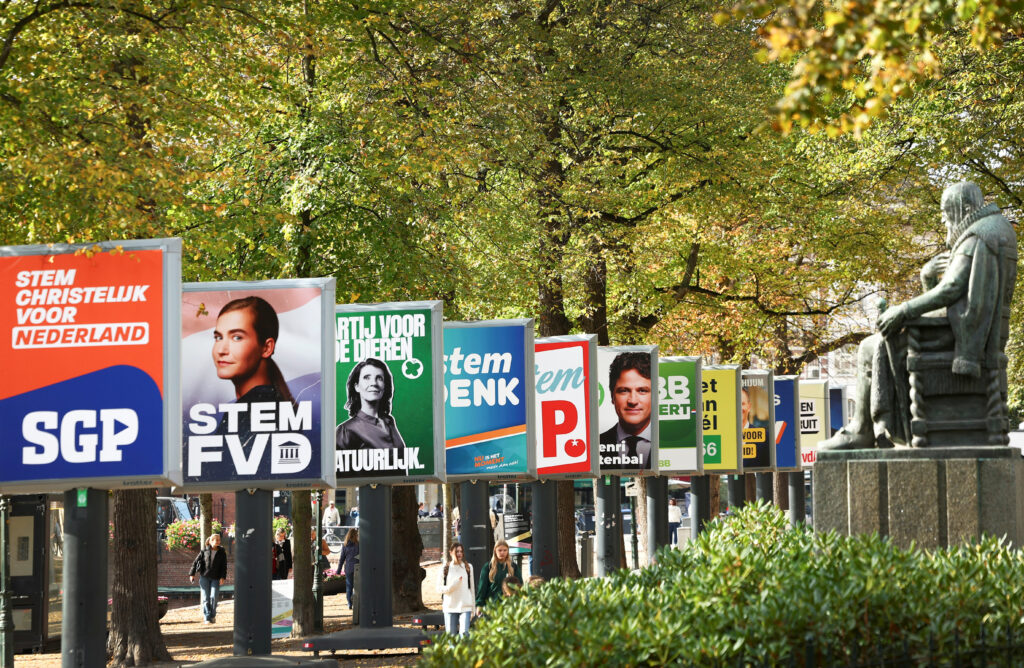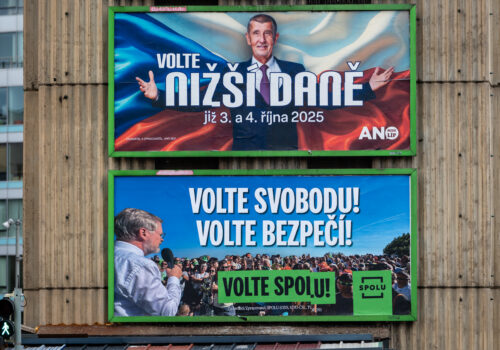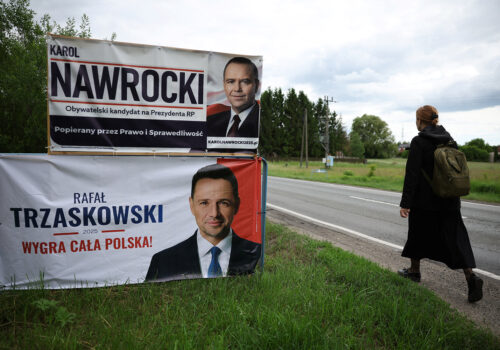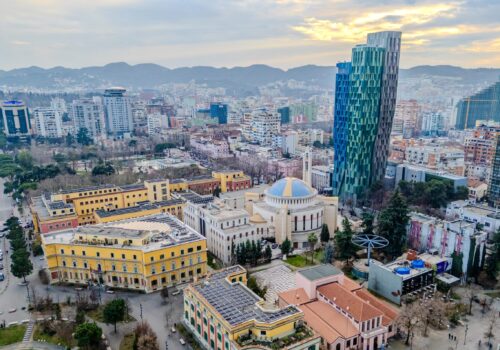Dutch voters will head to the polls on October 29 for parliamentary elections after the previous coalition government headed by independent Prime Minister Dick Schoof collapsed in June. The far-right Freedom Party (PVV), led by Geert Wilders, is expected to remain the country’s largest party in Parliament, but shifting support could result in a moderate coalition returning to power.
Ahead of the vote, Atlantic Council experts provide their insights on the defining issues of the elections, the competing parties, and how the results will affect the Netherlands’ foreign policy as a member of the European Union (EU) and NATO.
How does voting work?
The Netherlands holds elections to fill its 150-seat House of Representatives, the primary legislative body of the country’s bicameral Parliament, every four years, unless an election is called earlier following a government collapse, as occurred this June. This year, voters can choose among twenty-seven parties, with any party securing at least 0.67 percent of the national vote guaranteed a seat in Parliament. Voters may also cast a preferential vote for an individual candidate on a party list. If a candidate receives at least 0.17 percent of the total vote, they earn a seat ahead of others on the list, regardless of their ranking. The Netherlands has a multiparty system in which no single party has ever received a majority of seats, so coalition governments consisting of several parties are common.
—Jack Muldoon is a young global professional with the Atlantic Council’s Europe Center.
How did we get here?
Who is Geert Wilders?
Geert Wilders is a Dutch far-right politician who has led the Party for Freedom (PVV) since founding it in 2006.
He first entered Parliament in 1998 as a member of the People’s Party for Freedom and Democracy (VVD). He rose to prominence on the Dutch right after the 2004 murder of filmmaker Theo van Gogh, after which Wilders denounced Islam as a “fascist ideology.” That same year, Wilders left the VVD to form his own party centered on his opposition to Islam and immigration. The PVV has since proposed banning the Quran, closing all mosques, and freezing asylum applications. Until 2024, it also supported Dutch withdrawal from the European Union.
The PVV won nine seats in the 2006 election and surged to twenty-four seats in 2010, when it entered a confidence-and-supply agreement with the first cabinet of then Prime Minister Mark Rutte. After more than a decade in opposition, Wilders led the PVV to a surprise victory in 2023, winning thirty-seven seats and nearly a quarter of the national vote. Despite his party finishing first, Wilders withdrew his bid to become prime minister due to insufficient coalition support. Former intelligence chief Dick Schoof ultimately assumed the role, heading a coalition of the PVV, VVD, New Social Contract (NSC), and Farmer–Citizen Movement (BBB). Less than a year later, the PVV withdrew from the coalition over a dispute on asylum policy, triggering new elections.
The PVV’s 2025 campaign has been marked by controversy. In early August, Wilders faced criticism for posting an image on X that resembled 1930s propaganda, showing a woman’s face divided in two—one half labeled “PVV” and the other depicting a woman in a hijab labeled with the Dutch Labour Party (PdvA) logo. Anti-discrimination groups accused him of using “Nazi visual language,” a charge he has denied.
—Jack Muldoon
How is migration shaping Dutch politics?
Migration is the reason there have been two Dutch national elections in two years. Both of the last Dutch cabinets collapsed over this issue. According to Wilders, whose PVV party currently leads in the polls, the Netherlands’ number one problem is that it is being flooded by refugees. Yet the data tells a very different story.
Only 12 percent of all migrants that enter the Netherlands are asylum seekers. The vast majority are international students or workers. In 2024, roughly 85,000 migrant workers came to the Netherlands—more than triple the number in 2010. Most of these workers are employed in low-wage, labor-intensive sectors and often face poor living conditions.
The Netherlands faces a difficult choice. Its economy benefits from migrant labor and, with an aging population, that workforce has become essential to sustaining growth. If trends continue, the contribution of migrant labor to the Dutch economy— currently about 3 percent of GDP—is expected to rise to between 3.5 and 4.7 percent by 2030. Additionally, most of this migration takes place within the EU under the law on the free movement of people, making it difficult to restrict the inflow of workers. Yet the country lacks the infrastructure to ensure these workers receive fair wages, decent housing, and proper social protections. Tellingly, around 60 percent of homeless people in the Netherlands are or were migrant workers.
This is the true migration crisis, and it is a challenge the next Dutch government will have to confront head-on.
—Lize de Kruijf is a program assistant with the Atlantic Council GeoEconomics Center’s Economic Statecraft Initiative.
As the PVV continues to build momentum in the Netherlands, what does this signal for the far right across Europe?
Ahead of the October 29 snap election in the Netherlands, the PVV maintains a strong position since becoming the largest party in Parliament in 2023. The PVV’s success reflects broader anxieties about immigration, with the Netherlands hosting 2.9 million migrants (16.2 percent of the population) and facing a housing crisis that has been blamed on newcomers to the country.
But this isn’t a Dutch-specific story. Rather, this political trajectory mirrors a wider pattern unfolding throughout Europe. According to recent polling, Alternative for Germany (AfD), France’s National Rally, and Britain’s Reform UK are currently the most popular parties in their respective countries. This trend suggests that far-right parties can take Euroskeptic and anti-immigration stances and translate them into not just electoral legitimacy, but electoral success. This doesn’t, however, translate into an ability to govern. Far-right parties remain unreliable coalition partners, which Wilders’ 2025 withdrawal from government over immigration policy demonstrates. And in Germany, the “firewall” against the far right, which has prevented AfD from joining a governing coalition, holds. But right-wing populists continue to gain popularity, and that electoral strength continues to reshape mainstream politics. This has forced centrist parties rightward and normalized once-fringe positions on migration and national identity throughout Europe.
—Rachel Rizzo is a nonresident senior fellow with the Atlantic Council’s Europe Center.
How might the election redefine the Netherlands’ role in Europe’s economic and security order?
The Netherlands seems set to regain a stronger voice on the European scene after months of political paralysis since the government collapse. However, the shape of the next coalition will determine whether that voice is coherent or divided. The Dutch political system will likely remain quite fractured, but the Christian Democrats (CDA) could potentially return to power as it will likely be needed in any eventual coalition. If victorious, the CDA would likely anchor The Hague to Brussels and European politics. Built around the CDA, there might emerge a center-right or a center-left coalition. The former would potentially include the PVV, the liberal-democratic VVD (the party of former Prime Minister Mark Rutte), and JA21, a young center-right party. However, during the campaign, most parties ruled out cooperation with the PVV, which seems set to become the largest party. A CDA-based center-left coalition would likely include the left wing Green-Left-Labour party (GL-PvdA), headed by former European Commissioner Frans Timmermans, the progressive liberal-democratic D66, and probably at least one other party. However, even days before the vote, the outcome remains highly unpredictable.
Broader European and foreign policy issues have barely figured into the campaign. If the CDA returned to power, this would reinforce the Dutch relationship with the European Christian-Democratic network, which includes German Chancellor Friedrich Merz and European Commission President Ursula von der Leyen. Nonetheless, as Dutch politics remain fractured, a CDA victory would not necessarily lead to greater European stability.
The Christian Democrats did signal openness to discuss Eurobonds, a longtime taboo for centrist and right-wing parties. Eurobonds would institute the issuing of common EU debt, which many see as an important means to finance the European defense buildup. A center-left coalition could spur Dutch forward movement on common debt. However, to a center-right coalition that includes the VVD, Eurobonds would remain a hard sell. The VVD remains opposed to issuing joint European debt even for financing Europe’s defense buildup, while the PVV no longer resists Eurobonds for defense spending. The VVD and the CDA have traditionally opposed Eurobonds, as they insist that fiscal reform and prudence is required in Europe, not more debt-financed fiscal flexibility. Much will depend on the individual who becomes finance minister, though all Dutch political parties subscribe to the need to strengthen European competitiveness, broadly embracing the recommendations of the Draghi report.
On security policy, a fundamental shift in the Dutch outlook from staunch Atlanticism to greater Europeanization can already be witnessed, for example in intelligence and defense cooperation. This structural change in Dutch foreign and security policy will most likely persist regardless of the outcome, but this shift would probably speed up under a center-left coalition. The Dutch remain strongly committed to NATO, and there are deep ties with the United States. However, the changing US role in world politics is forcing the Netherlands to readjust. Thus, if the CDA wins, expect a more Europeanist tone from The Hague, but few major foreign policy moves.
—Elmar Hellendoorn is a nonresident senior fellow with the Atlantic Council’s GeoEconomics Center.
Who are the key parties to watch?
Party for Freedom (PVV)
Leader: Geert Wilders
European Parliament affiliation: Patriots for Europe (PfE)
The PVV leads the polls but is expected to lose some of the thirty-seven seats that it currently holds. The party’s campaign has focused on strict immigration reform, including a complete freeze on asylum claims, returning Syrians and male Ukrainian refugees to their home countries, and deploying the army for border control. It has blamed the housing crisis, the most potent issue in the election, on immigrants, and it plans to cut red tape to incentivize construction.
GroenLinks & Labour Party
Leader: Frans Timmermans
European Parliament affiliation: Socialists and Democrats (S&D) & Greens/European Free Alliance (Greens/EFA)
GroenLinks-PvdA is an electoral alliance between the Netherlands’ preeminent environmentalist and center-left parties. Following its first-place finish in 2024’s European Parliament elections, the alliance is polling in second place in the upcoming Dutch parliamentary elections. The parties’ platform focuses on affordability and the stated goal of building 100,000 new homes per year, though they have not committed to guaranteeing this target. The coalition has also proposed introducing a cap on net migration to between 40,000 and 60,000 people a year.
Christian Democratic Appeal (CDA)
Leader: Henri Bontenbal
European Parliament affiliation: European People’s Party (EPP)
Led by Henri Bontenbal, a relative newcomer in Dutch politics, the CDA has returned to prominence after years of political decline. The party has emphasized rebuilding trust and decency in politics, hoping that voters are seeking a return to normalcy. Its campaign platform includes promises to build new homes in “add-on neighborhoods,” create a “family-centered welfare state” with higher child benefits, and advance what it considers a middle-ground approach to migration and climate policy.
People’s Party for Freedom and Democracy (VVD)
Leader: Dilan Yeşilgöz
European Parliament affiliation: Renew Europe (RE)
The party of Mark Rutte, the former prime minister and current NATO secretary general, the VVD is expected to lose seats this year as some voters feel it has tacked too far to the right. Its party platform has focused on lowering taxes for business owners, increasing financial benefits for workers, and increasing defense spending to 3.5 percent of gross domestic product.
Democrats 66 (D66)
Leader: Rob Jetten
European Parliament affiliation: Renew Europe (RE)
Led by former climate minister Rob Jetten, D66 has made strong gains in the polls in recent weeks. The party’s messaging has focused on tackling the housing crisis, with an ambitious plan to build ten new cities. One of these new cities, “IJstad,” is to be built on 9.65 square miles of land reclaimed from IJmeer lake between Amsterdam and Almere, contain 60,000 homes, and cost roughly €20 billion. It has also promised to phase out mortgage tax relief and use the revenue to lower income taxes.
Right Answer 2021 (JA21)
Leader: Joost Eerdmans
European Parliament affiliation: European Conservatives and Reformists (ECR)
A populist spin-off party from the far-right Forum for Democracy (FvD) party, JA21 campaigns on reducing regulations, promoting entrepreneurship, and expanding direct democracy through binding referendums. JA21’s campaign promises include strict migration policies to ease demand for housing, increased funding for domestic security, and significant reductions to corporate taxes.
Campaign issues
Housing policy
Roughly half of Dutch voters view housing scarcity as the most important issue in the elections, as the country suffers from a shortage of 400,000 houses in a country of only 18 million people. Almost every party has made this issue a major part of their platform, but their approaches have differed greatly.
The PVV and JA21 have claimed that asylum seekers are the reason for the large shortages and have promised to increase housing supply by eliminating regulations that stifle construction. D66 leader Rob Jetten has committed to building 100,000 new homes a year, even as the outgoing government has consistently failed to meet this same target and is on track to build only 73,000 this year. CDA and VVD dropped their commitment to build 100,000 homes from their platforms, claiming that this promise would be impossible to keep. The CDA, GroenLinks-PvdA, and D66 have all pledged to phase out the mortgage interest deduction; meanwhile, the VVD has ruled out any changes to the benefit and said they won’t join a coalition with any party that plans to eliminate the deduction.
Immigration and asylum
Debates over immigration have dominated Dutch politics for years and played a large role in propelling the PVV to victory in 2023, but the issue has since lost some salience. Wilders has continued to call for a total halt to asylum-seekers entering the Netherlands, along with using the military to secure the border and closing recently opened centers for asylum seekers. VVD and JA21 have also taken hardline stances aimed at making the asylum process harder. Many other parties sought to moderate their positions on immigration, with the GL-PvdA seeking to cap net migration between 40,000 and 60,000 per year. GL-PvdA and D66 have also sought to protect labor migrants from exploitation.

The Europe Center promotes leadership, strategies, and analysis to ensure a strong, ambitious, and forward-looking transatlantic relationship.
Further reading
Image: Election campaign boards are displayed ahead of the Dutch parliamentary election on October 29, in The Hague, Netherlands, October 7, 2025. REUTERS/Piroschka van de Wouw.



